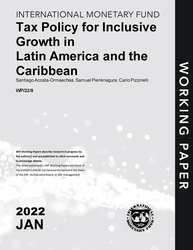
Tax Policy for Inclusive Growth in Latin America and the Caribbean
Tax Policy for Inclusive Growth in Latin America and the Caribbean
READ MORE...
Volume/Issue:
Volume 2022
Issue 008
Publication date: January 2022
ISBN: 9781616358297
$5.00
Add to Cart by clicking price of the language and format you'd like to purchase
Available Languages and Formats
| English |
Prices in red indicate formats that are not yet available but are forthcoming.
Topics covered in this book
This title contains information about the following subjects.
Click on a subject if you would like to see other titles with the same subjects.
Economics- Macroeconomics , Public Finance , Taxation - General , Economics / General , Taxation , Progressivity , Inclusive Growth , Latin America and the Caribbean , OECD tax revenue statistics database , OECD sample , OECD countries sample , income level , OECD distribution , OECD group , OECD member , OECD benchmark , PIT revenue , Personal income tax , Corporate income tax , Income tax systems , Income and capital gains taxes , Caribbean , Global
Also of interest
Summary
This study provides an overview of tax structures in LAC before the COVID-19 pandemic, compares it to OECD countries, and provides recommendations for growth-friendly and inclusive tax policy reforms. LAC countries collect significantly lower tax revenue relative to OECD countries and have tax structures that rely excessively on corporate-income taxes (CIT) while personal-income taxes (PIT) remain largely underutilized. LAC countries could strengthen their PIT to mobilize revenue and improve progressivity by addressing critical design flaws. Possible adverse growth effects could be mitigated by providing incentives to labor force participation and formalization (e.g., through earned-income tax credits). The ongoing global corporate income tax reforms present a great opportunity to reassess thoroughly the CIT in LAC. Specifically, reforms would need to focus on aligning CIT statutory rates with those of other regions—when assessed to be relatively high—to attract investment and alleviate profit shifting, and on broadening the corporate tax base. Value-added taxes (VAT) could be improved by tackling exemptions and reduced rates. Furthermore, while estimates of additional revenue from levying the VAT on the digital economy appear modest, taxing this sector as others in the economy is critical to avoid further tax base erosion.
Copyright © 2010 - 2026
Powered by:
AIDC



